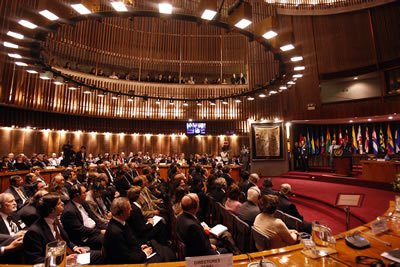At ECLAC, Chinese Premier Proposes High-level Cooperation Forum with Latin America and the Caribbean
Work area(s)
He stated that the Community of Latin American and Caribbean States (CELAC) has enabled the region to increase its strength of cohesion, action and influence.

(26 June 2012) In order to deepen strategic relations with the region, today the Chinese Premier Wen Jiabao proposed the creation of a China-Latin America cooperation forum and the establishment of a regular dialogue mechanism with the troika of Foreign Ministers from the Community of Latin American and Caribbean States (CELAC) - with a first meeting due to be held during 2012.
The Executive Secretary of the Economic Commission for Latin America and the Caribbean (ECLAC), Alicia Bárcena, welcomed Wen Jiabao on behalf of the Commission. From ECLAC, he then sent out a message to the Latin American and Caribbean region on the occasion of his official visit to Brazil, Uruguay, Argentina and Chile.
In his ECLAC speech, the Chinese Premier put forward concrete proposals for cooperation in areas such as food security, innovation, science and technology and sustainable development.
Wen Jiabao announced the creation of a cooperation fund for the region with an initial input of 5.0 billion dollars to promote, inter alia, the development of the manufacturing industry, as well as a credit line of 10.0 billion dollars to boost infrastructure cooperation through the Bank of China.
He proposed creating various forms of intergovernmental consultation mechanisms, broadening contacts among legislative institutions, political parties and territorial governments and strengthening the exchange of experiences in terms of State governance and the handling of administrative matters. He also suggested the creation of a forum for Ministers of Agriculture and another forum for Scientific and Technological Innovation.
He mentioned that his country will give active consideration to ECLAC's proposal to hold periodic meetings with the region's Heads of State and Government.
In the context of the visit by Wen Jiabao, today ECLAC launched the document The People's Republic of China and Latin America and the Caribbean: Dialogue and cooperation for the new challenges of the global economy, which examines recent trade and investment trends.
According to the report, trade between China and the region is strikingly interindustrial, which means that China exports manufactured goods to the region, while Latin America and the Caribbean exports mainly raw materials.
The document states that this reduces the potential for possible Chinese-Latin American business partnerships, and hampers a more effective integration of the region's countries into the production chains of Asia-Pacific.
Only four of the region's countries (all in South America) posted surpluses in their trade with China in 2011: Brazil, Chile, Venezuela and Peru. In all cases, this was due to sales of a smaller number of commodities.
At the other extreme there is Mexico's trade deficit with China: while less than 2% of Mexican exports in 2011 went to China, 15% of Mexico's imports that year came from China.
With this in mind, Wen Jiabao stated that China does not seek to have a trade surplus, but rather that it wishes to have balanced trade with the region by increasing future imports of products with greater added value from Latin America and the Caribbean. According to the country's Premier, China expects the volume of trade with the region to be worth more than 400.0 billion dollars in the next five years.
According to Ms. Bárcena, "Latin America and the Caribbean's growing economic and trade ties with China raise opportunities and concerns", and it was therefore essential to set up an agenda for dialogue and cooperation between the two parties.
The opportunities of the relationship with China mentioned by Ms. Bárcena included improved terms of trade, higher growth rates and additional resources to invest in education, infrastructure and innovation. The concerns related to the reprimarization of exports, deindustrialization, Dutch disease, land access and immigration.
Wen Jiabao proposed deepening the friendship between the peoples of China and Latin America, while promoting mutual respect and peaceful coexistence. He said that, although China had experienced dramatic changes, it was still a developing country and its cooperation policy and feelings of solidarity with Latin American and Caribbean countries remained unchanged. China will definitely continue its path of peaceful development. Quoting a Chilean saying, he stated that friends are like stars: they are far away but you know they are there.
Also see:
- Full version of the document: The People's Republic of China and Latin America and the Caribbean: Dialogue and cooperation for the new challenges of the global economy (in Spanish)
- Welcome words by Alicia Bárcena, ECLAC Executive Secretary (in Spanish)
- Full text of Chinese Premier's speech at ECLAC
Any queries should be sent to the ECLAC Public Information and Web Services Section. E-mail: prensa@cepal.org; Telephone: (56 2) 210 2040.
Follow us on: Twitter, Facebook, Flickr and YouTube.
Country(ies)
- Latin America and the Caribbean
-
China
Contact
Public Information Unit
- prensa@cepal.org
- (56 2) 2210 2040